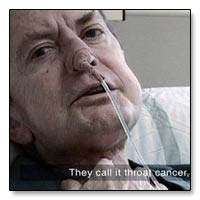- 7/5/2004
- Liverpool, UK
- By Mark Hookham
- Liverpool Daily Post

A father who died of cancer before he could be reunited with his daughter features in a hard-hitting NHS anti-smoking advert launched today.
Anthony Hicks, from Bootle, Merseyside, was filmed from his hospital bed talking about the impending visit of his daughter, Alexandra, who lives in the United States. The father-of-two is barely audible, and with a visible hole or stoma in his throat following a laryngectomy operation to remove his voicebox. His final words to camera are: “I will be alive to see that” – but the subtitles reveal he died 10 days after filming in September last year and never got to see his daughter. Mr Hicks was a 20 to 40-a-day smoker and developed three independent cancers in his larynx, mouth and lung, all of which were caused by smoking.
The advert is part of the Department of Health’s Don’t Give Up Giving Up campaign, and aims to raise awareness of head and neck cancer. It will launch on television today and on radio from next week. Mr Hicks’s consultant, Shaun Jackson, head and neck cancer surgeon at University Hospital in Aintree, said: “There is some public awareness of throat and oral cancer, but few people realise that cancer can actually occur in any of the tissues and organs in the head and neck. “Often the symptoms can be gradual and can take many months to become apparent, lying virtually dormant until your 40’s or 50’s”.
“Smoking is by far and away the biggest risk factor for such cancers – by stopping completely, you greatly reduce your risk of developing the condition and vastly improve your chances of recovery if a tumour has already developed undetected. Patients who develop head and neck cancer face the prospect of invasive surgery, physical deformities and a potentially bleak prognosis for survival – stopping smoking is the first and most important step for both prevention and cure.”
The advert is one of a number of personal stories filmed in the last two years designed to shock smokers into giving up. Roger Holmes, from Sefton Cancer Support Group, believes hard-hitting advertisements work. He said: “I think the shock treatment does really work. People always think it will not happen to them but then it always can. We show people a jar with rubbish taken from a smokers lungs – people are always appalled and unfortunately it’s sometimes only that kind of thing which works.”
Steve Mason, 46, from Liverpool, a throat cancer sufferer who also underwent a laryngectomy, urged smokers to quit: “I wish I had a second chance and could turn the clock back, but I can’t. My family and I have to live with the consequences of smoking every day. Speaking, eating, breathing – all things you take for granted, which I now find nearly impossible. To any smokers still thinking about giving up: don’t wait until it’s too late. Give up now and give up for good while you still can. Giving up smoking is hard, but believe me, living with a laryngectomy isn’t easy.”
There are about 7,500 cases a year of head and neck cancer diagnosed in Britain. It is the only cancer whose prevalence and mortality rates are still on the increase in the UK, with cases rising by 17% over the last four years. Head and neck cancers are hard to detect, with possible early symptoms as innocuous as mouth ulcers and a sore throat or even hiccups. But without early detection the survival rates are low – fewer than half of those diagnosed with the disease survive five years. The Government says more than 90% of oral and throat cancer sufferers either smoke or chew tobacco.
Poll backs ban in public places
A POLL for BBC Breakfast says nearly two-thirds of the public want a smoking ban in enclosed public places. The ICM poll showed 65% of people questioned supported a ban in enclosed public spaces such as pubs and restaurants with 34% against. Among smokers themselves nearly half supported a ban – with 42% in favour. Among non-smokers, the figure was 76%. The poll also found 70% of people are worried about the risk to their health from breathing other people’s smoke. But only 52% of people are in favor of increasing duty on cigarettes to discourage smoking.
ICM Research interviewed a nationally representative sample of 1,002 adults aged 18 and over by phone from July 2-3, 2004.
* SMOKERS are urged to call the NHS Smoking Helpline free on 0800 169 0 169 to help them give up, visit www.givingupsmoking.co.uk/, text ‘GIVE UP’ and their full postcode to 88088 or visit their local GP.

Leave A Comment
You must be logged in to post a comment.